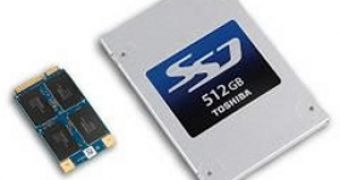There is a new type of NAND Flash chips now in use, one that Toshiba decided to put to work in its newest SATA and mSATA solid-state drive collection.
Toshiba first announced 19nm-class NAND Flash production about two months ago (April, 2012), but only now has it launched products designed with such semiconductors.
There are eleven of them in total. Four use the standard 2.5-inch form factor, four have 7mm 2.5-inch package and the other three come in mSATA format.
The two 2.5-inch lines are pretty much identical in everything except physical size. The capacities are of 64 GB, 128 GB, 256 GB and 512 GB.
As with most SSD lines out there, performance varies according to the capacity of the storage units.
That means that the 64 GB models are limited to data transfer rates of 440 MB/s, as opposed to 524 MB/s.
Meanwhile, the mSATA drives have 64 GB, 128 GB and 256 GB capacities and the same respective performance parameters as the others.
Toshiba put together the 19nm SSDs with Windows 8 and future Linux operating system versions in mind.
Deterministic Zeroing TRIM is the mark of that compatibility: a performance-optimized garbage collection mode that will work with Windows 8 and future Linux kernels.
There is a read-only mode too, (higher security), plus the performance-optimized error-correction feature known as Quadruple Swing-by Code (QSBC).
Finally, Toshiba's products support SATA revision 3.1-compliance (better power management).
Unfortunately, the product developer won't begin shipping the drives before August (2012). When it finally does, though, we believe all notebook makers will show interest in them. The larger 2.5-inch units will land in normal or gaming laptops, while the thinner SATA and mSATA will become part of ultrabooks.
No word yet on any new business or enterprise SSDs, which means that OCZ has that segment in hand for the time being.

 14 DAY TRIAL //
14 DAY TRIAL //